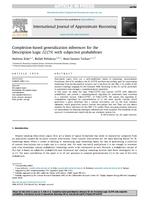LATPub571: Unterschied zwischen den Versionen
Aus International Center for Computational Logic
Marcel Lippmann (Diskussion | Beiträge) KKeine Bearbeitungszusammenfassung |
Marcel Lippmann (Diskussion | Beiträge) KKeine Bearbeitungszusammenfassung |
||
| Zeile 18: | Zeile 18: | ||
}} | }} | ||
{{Publikation Details | {{Publikation Details | ||
|Abstract=Description Logics (DLs) are a well-established family of knowledge | |Abstract=Description Logics (DLs) are a well-established family of knowledge representation formalisms. One of its members, the DL $mathcal{ELOR}$ has been successfully used for representing knowledge from the bio-medical sciences, and is the basis for the OWL 2 EL profile of the standard ontology language for the Semantic Web. Reasoning in this DL can be performed in polynomial time through a completion-based algorithm. | ||
representation formalisms. One of its members, the DL $ | In this paper we study the logic Prob-$mathcal{ELOR}$, that extends $mathcal{ELOR}$ with subjective probabilities, and present a completion-based algorithm for polynomial time reasoning in a restricted version, Prob-$mathcal{ELOR}^c_{01}$, of Prob-$mathcal{ELOR}$. We extend this algorithm to computation algorithms for approximations of (i)~the most specific concept, which generalizes a given individual into a concept description, and (ii) the least common subsumer, which generalizes several concept descriptions into one. Thus, we also obtain methods for these inferences for the OWL 2 EL profile. These two generalization inferences are fundamental for building ontologies automatically from examples. The feasibility of our approach is demonstrated empirically by our prototype system GEL. | ||
successfully used for representing knowledge from the bio-medical | |||
sciences, and is the basis for the OWL 2 EL profile of the standard | |||
ontology language for the Semantic Web. Reasoning in this DL can be | |||
performed in polynomial time through a completion-based algorithm. | |||
In this paper we study the logic Prob-$ | |||
subjective probabilities, and present a completion-based algorithm | |||
for polynomial time reasoning in a restricted version, Prob-$ | |||
of Prob-$ | |||
approximations of (i)~the most specific concept, which generalizes a | |||
given individual into a concept description, and (ii) the least common | |||
subsumer, which generalizes several concept descriptions into one. | |||
Thus, we also obtain methods for these inferences for the OWL 2 EL | |||
profile. These two generalization inferences are fundamental for | |||
building ontologies automatically from examples. The feasibility of | |||
our approach is demonstrated empirically by our prototype system GEL. | |||
|ISBN= | |ISBN= | ||
|ISSN= | |ISSN= | ||
| Zeile 55: | Zeile 39: | ||
year = {2014}, | year = {2014}, | ||
} | } | ||
}} | }} | ||
Version vom 23. März 2015, 13:24 Uhr
Completion-based Generalization Inferences for the Description Logic ELOR with Subjective Probabilities
Andreas EckeAndreas Ecke, Rafael PeñalozaRafael Peñaloza, Anni-Yasmin TurhanAnni-Yasmin Turhan
Andreas Ecke, Rafael Peñaloza, Anni-Yasmin Turhan
Completion-based Generalization Inferences for the Description Logic ELOR with Subjective Probabilities
International Journal of Approximate Reasoning, 55(9):1939-1970, 2014
Completion-based Generalization Inferences for the Description Logic ELOR with Subjective Probabilities
International Journal of Approximate Reasoning, 55(9):1939-1970, 2014
- KurzfassungAbstract
Description Logics (DLs) are a well-established family of knowledge representation formalisms. One of its members, the DL $mathcal{ELOR}$ has been successfully used for representing knowledge from the bio-medical sciences, and is the basis for the OWL 2 EL profile of the standard ontology language for the Semantic Web. Reasoning in this DL can be performed in polynomial time through a completion-based algorithm. In this paper we study the logic Prob-$mathcal{ELOR}$, that extends $mathcal{ELOR}$ with subjective probabilities, and present a completion-based algorithm for polynomial time reasoning in a restricted version, Prob-$mathcal{ELOR}^c_{01}$, of Prob-$mathcal{ELOR}$. We extend this algorithm to computation algorithms for approximations of (i)~the most specific concept, which generalizes a given individual into a concept description, and (ii) the least common subsumer, which generalizes several concept descriptions into one. Thus, we also obtain methods for these inferences for the OWL 2 EL profile. These two generalization inferences are fundamental for building ontologies automatically from examples. The feasibility of our approach is demonstrated empirically by our prototype system GEL. - Forschungsgruppe:Research Group: AutomatentheorieAutomata Theory
@article{ EcPeTu-IJAR-14,
author = {Andreas {Ecke} and Rafael {Pe{\~n}aloza} and Anni-Yasmin {Turhan}},
doi = {http://dx.doi.org/10.1016/j.ijar.2014.03.001},
journal = {International Journal of Approximate Reasoning},
number = {9},
pages = {1939--1970},
publisher = {Elsevier},
title = {Completion-based Generalization Inferences for the Description Logic $\mathcal{ELOR}$ with Subjective Probabilities},
volume = {55},
year = {2014},
}
